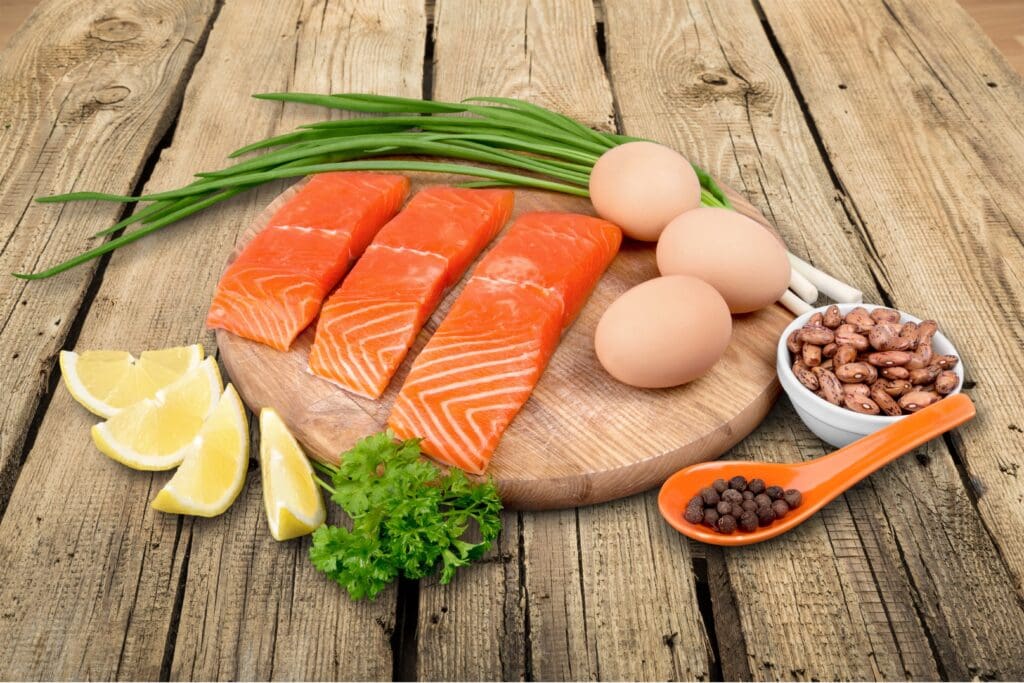September 26, 2025
The Power of Protein in Menopause Weight Loss
Menopause is a natural phase of life, but it often brings unexpected changes, especially when it comes to weight. Many women notice they gain weight more easily during this time, particularly around the midsection, even when their eating habits and exercise routines remain the same. One of the most effective, yet often overlooked, strategies for managing weight during menopause is increasing your protein intake.

Why Does Menopause Affect Weight?
As oestrogen levels decline during menopause, several changes occur that impact weight management, including:
- A slower metabolism
- Loss of lean muscle mass
- Increased fat storage, especially visceral fat
- Changes in appetite and feelings of fullness
These shifts make it more challenging to maintain or lose weight, but this is precisely where protein plays a vital role.
The Role of Protein in Midlife Health
Let’s explore some key facts about protein that are often underestimated. Protein is crucial not only for weight management but also for hormonal balance and overall health, especially during midlife, when the body’s nutritional needs begin to change. While protein is commonly associated with athletes and muscle building, its benefits extend far beyond the gym. Here are some important insights you may not have encountered before:
- Your Body Can’t Store Protein
Unlike carbohydrates and fats, your body does not have a “protein bank” to draw from. This means it’s important to consume adequate protein daily, particularly during menopause when muscle mass naturally declines. - Protein Helps You Burn More Calories
Protein has the highest thermic effect of food, meaning your body uses more energy to digest protein than it does for carbs or fat. Simply eating protein can boost your calorie burn. - Breakfast Sets the Tone
I often highlight the importance of a high-protein breakfast to my clients, and for good reason. Research consistently shows that starting your day with protein can help reduce cravings and control hunger throughout the day. Simply swapping out sugary cereals for options like eggs or Greek yogurt can be a powerful, yet simple, way to stabilise energy levels and better manage appetite. - It’s Good for Your Bones, Too
Protein is often linked to muscle health, but it also plays a critical role in maintaining strong bones. Getting enough protein may help reduce the risk of osteoporosis, particularly after menopause. - You Can Get Protein from Plants
Meat isn’t the only source of protein. Lentils, quinoa, tofu, tempeh, hemp seeds, and peas are all excellent plant-based proteins. - Protein Boosts Brain Function
Protein provides amino acids, the building blocks for neurotransmitters like serotonin and dopamine, which support mood, memory, and mental focus, all important during hormonal fluctuations. - More Muscle = Better Metabolism
Protein supports muscle maintenance and growth. More muscle mass leads to a faster metabolism, which helps support long-term weight loss and healthy aging.
Summary of Key Benefits of Protein for Weight Management During Menopause
- Preserves Lean Muscle Mass
Protein is essential for maintaining muscle, which naturally declines with age. More muscle means a higher resting metabolism, helping you burn more calories even at rest. - Boosts Metabolism
Due to its higher thermic effect, protein digestion requires more energy, providing a small but meaningful metabolic boost. - Supports Satiety and Reduces Cravings
Protein helps you feel fuller for longer, which can be particularly beneficial during menopause when hormonal changes often increase hunger and cravings, especially for sugary or processed foods.
How Much Protein Do You Need?
While individual needs vary, a general guideline for women over 40 is 1.2 to 2.0 grams of protein per kilogram of body weight per day. For example, a 70 kg woman should aim for approximately 84–140 grams of protein daily.
For optimal benefits, spread your protein intake evenly throughout the day, aiming for about 20–30 grams per meal. Examples include:
- Greek yogurt with chia seeds and berries for breakfast – contains approximately 25 grams of protein
- Chicken salad or tofu stir-fry for lunch – A typical chicken breast contains 25 grams of protein (a typical serving of 100 grams of tofu contains 8 grams of protein
- Salmon, quinoa, and steamed greens for dinner – contains approximately 35 grams of protein
- Protein-rich snacks like cottage cheese, boiled eggs, or a quality protein shake – an egg contains approximately 6 grams of protein, 1/2-cup serving of cottage cheese offers about 12 to 15 grams of protein
Final Thoughts
Prioritising protein is one of the simplest and most effective changes you can make to support healthy weight loss during menopause. When combined with strength training, quality sleep, and stress management, it can significantly improve how you look, feel, and function during this important stage of life.
If you’re unsure where to start, I’m here to help you create a personalised nutrition and lifestyle plan tailored to your body, goals, and life stage.
👉 Ready to feel strong, balanced, and in control again? Book a free 15 minute discovery call here.